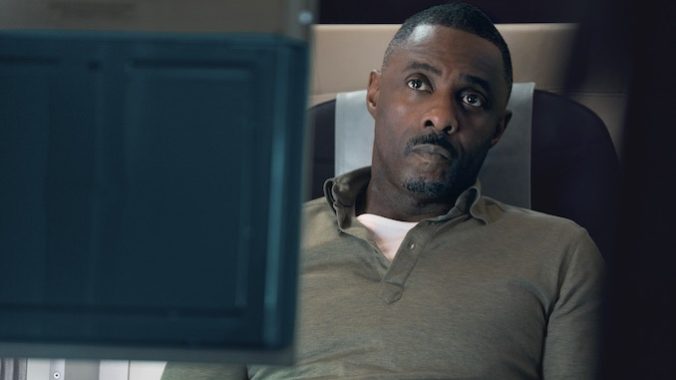Apple TV+’s Hijack Is High-Octane Fun Despite Its Bloated Runtime
Photo Courtesy of Apple TV+
What a peculiar and classically Peak TV moment Hijack comes to us in. The limited series thriller stars Idris Elba as a mediator who finds his skills put to the test when his Dubai to London flight is taken over by armed gunmen, and is refreshingly frank about its goals. This is nuts-and-bolts escapism, a show that colors its characters just enough to deliver the rollercoaster thrills of a high concept premise, and cleverly written to ensure a satisfactory conclusion to its narrative crisis. It’s an upscaled ‘90s thriller, made by people with deep affection for the finest era of Hollywood crowd-pleasers. Where’s the downside?
The immediate issue is that Hijack comes at a point where theaters are in dire need of sophisticated but unpretentious genre entertainment… but Hijack is an elongated streaming series. Everything that would be a positive for Hijack if it were a film turns into a slight drawback by it being a series: if there’s one thing audiences don’t need, it’s more TV trying to be movies, where premises are stretched out instead of being as punchy as possible, and the complexity of characters is limited to a point that’s completely acceptable on the big screen, but clearly thin on the small one.
Clearly, the gimmick of following the flight in real time lends itself to longer form storytelling, but it still feels like a pure distillation of Peak TV’s general slide into meaninglessness: this was commissioned years ago by a platform desperate for eye-catching ideas, but yet establishing a tone and quality control for their programming, and is releasing at a time where we’re much more critical of what we spend our time watching.
This only hampers Hijack’s exciting nature a little bit; it’s pretty well-executed, high-octane fun. Sam Nelson (Idris Elba) just wants to make a big romantic gesture to his ex-wife Marsha (Christine Adams) because, apparently, since it worked in Die Hard, the jilted, difficult ex-husband archetype must be used in all Die Hard-adjacent media afterwards. His amorous intentions are rewarded soon with Stuart (Ben Wheatley regular and Utopia standout Neil Maskell) and his band of merry hijackers, not to mention the boiling emotions of the rest of the crew and passengers, eager for the situation to not take a nosedive. The buildup to the guns being pulled is delightfully smart: we notice little things being off, hone in on the suspicious characters who might be hijackers, and get surprised when it suddenly kicks off.
The writing, led by creators Jim Field Smith and George Kay (Netflix’s Criminal, BBC’s Stag) understands that thrillers like these need shrewd, sharp problem-solving at every stage; how can the passengers win a slight advantage, how can they work together to gain and undermine the hijackers’ trust, how can they secretly pass out messages to the outside world? From about the second episode (of seven in total), we get a steady, regular series of 4D chess-style attempts to outsmart their captors, with the ensemble of crew and passengers filled with compelling personas that may only have a small sliver of screentime, but make every moment count in perilous circumstances. At one point, Sam lies barefaced to Stuart that he was told a crucial bit of information by a doctor on the other side of the plane—and the negotiator has until Stuart walks the length of the aircraft to pass on what the doctor needs to say when Stuart reaches him.
-

-

-

-

-

-

-

-

-

-

-

-

-

-

-

-

-

-

-

-

-

-

-

-

-

-

-

-

-

-

-

-

-

-

-

-

-

-

-

-








































